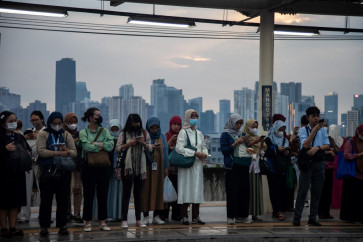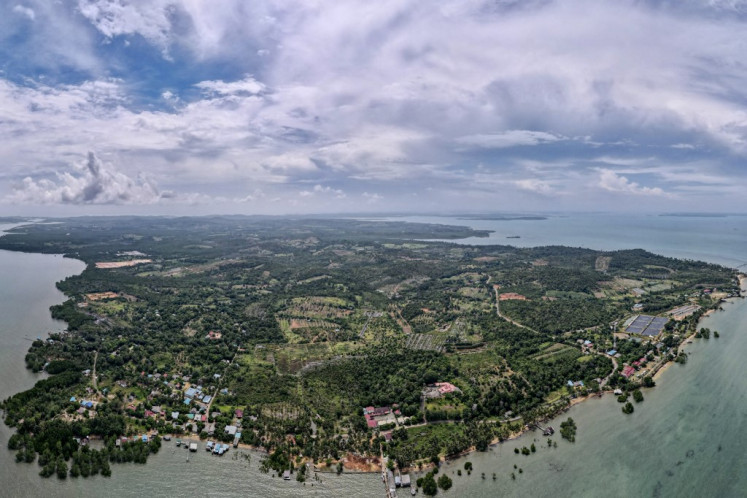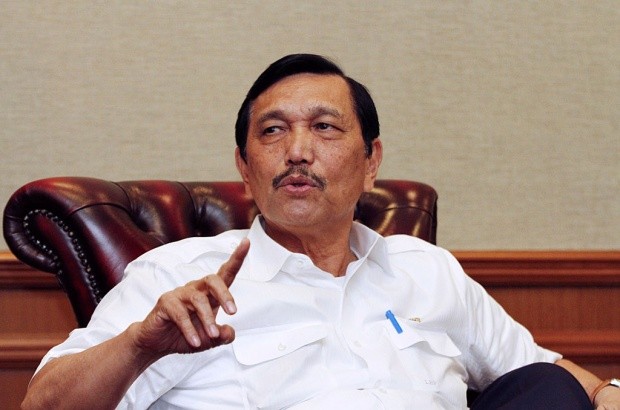Popular Reads
Top Results
Can't find what you're looking for?
View all search resultsPopular Reads
Top Results
Can't find what you're looking for?
View all search resultsEx-Golkar lawmaker to lead Constitutional Court
JP/Wendra Ajistyatama Newly elected Constitutional Court (MK) chief justice Akil Mochtar is expected to maintain the court’s independence in a less outspoken way than his predecessor, Mahfud MD
Change text size
Gift Premium Articles
to Anyone
J
em>JP/Wendra Ajistyatama Newly elected Constitutional Court (MK) chief justice Akil Mochtar is expected to maintain the court’s independence in a less outspoken way than his predecessor, Mahfud MD.
Akil was elected by his peers to lead the court a day after a House of Representatives’ plenary session extended his appointment as justice.
The former Golkar Party politician will become the third person to chair the Constitutional Court, which was established in 2003 following an amendment to the 1945 Constitution.
Seven of nine justices on the court voted for Akil on Wednesday after three rounds of voting, with his strongest rival in the race, Harjono, receiving only two votes.
In a speech before voting began, Akil said that the Constitutional Court and the chief justice shared the same strategic role in upholding the Constitution.
“Yet, a chief justice is merely the one who manages and organizes other justices, as the leadership of the nine justices is collective and collegial,” Akil said.
“However, we cannot rule out that sometimes what a chief justice does will be perceived by the public as representing the institution,” he added.
Speaking for his fellow justices, Akil said such perceptions were wrong, claiming that the official stance of the court came in the form of rulings that were agreed to collectively.
“This is not a one-man show. I don’t think I’m looking for popularity,” Akil said after his election, adding that maintaining the independence and integrity of the court was his priority.
Akil, who served as a Golkar lawmaker from 1999 to 2008, was also deputy chairman of House Commission III overseeing legal affairs.
He has garnered the support within the House, which has previously complained about Constitutional Court decisions annulling the laws that it has passed.
On Tuesday, lawmakers agreed to extend Akil’s tenure as a justice without requiring him to submit to the usual “fit-and-proper” tests.
Akil’s reappointment to the court is currently awaiting endorsement from President Susilo Bambang Yudhoyono in the form of a presidential decree.
“As all of you can see, there is a democratic process in the Constitutional Court. There was no lobbying here,” Akil said after his election. “I did not know whether I would win.”
He added that it would not have taken three rounds had his appointment been fixed or manipulated.
Akil said that the court decided to vote to determine its next chief after failing to reach consensus during a closed plenary meeting earlier that day. “Too many justices wanted to become chief justice,” he added.
During the plenary meeting on Wednesday, two Constitutional Court justices who were appointed by the Supreme Court, Anwar Usman and Muhammad Alim, reportedly told their colleagues that they did not want to run for chief.
Meanwhile, Jamil Mubarok from the Indonesia Transparency Society (MTI) urged Akil not to speak too much to the public.
“A chief justice must not tell everything to the public all the time. It’s unethical,” he told The Jakarta Post over the telephone.
“It’s better that he shuts down his personal website [akilmochtar.com] as his expressions there can be potentially misinterpreted by those seeking justice,” he added.
Separately, Saleh Husin, a lawmaker from the People’s Conscience Party (Hanura), agreed with Jamil, saying that the new Constitutional Court chief should tend to the work of the court, rather than speaking to the media. “We hope that he can focus on handling cases.”
Jamil called on Akil to be free of political influence in doing his job as chief justice ahead of the 2014 elections. “Independence is a must.”
Other than reviewing laws, the court adjudicates election disputes.
Akil was previously linked to a bribery case in 2010, when he was accused of accepting a Rp 1 billion (US$111,000) bribe from Jopinus Ramli Saragih, the regent of Simalungun, North Sumatra, to uphold his victory in an election
dispute.
Akil was cleared of the allegations in 2011, after an ethics panel said it did not find any evidence that Akil had met with Ramli outside the court.
“There has been no evidence found, directly or indirectly, that Jopinus Ramli Saragih actually handed the money to judge Akil Mochtar; they have never even met outside the court,” Harjono said.
Name: Muhammad Akil Mochtar
DoB: Putussibau, West Kalimantan, Oct. 18, 1960
Education:
• 1986 Undergraduate degree in law, Panca Bhakti University, Pontianak
• 2002 Master’s in law, Padjajaran University, Bandung
• 2009 Doctorate in law, Padjajaran University, Bandung
Career:
• 1984-1999 Attorney
• 1999-2008 Golkar Party lawmaker
• 2004-2006 Commission III deputy chair
• 2008-2013 Constitutional Court justice
• 2013-2015 Elected Constitutional Court chief justice
Affiliations:
• Chairman, Muhammadiyah Student Association, Pontianak
• Chairman, Indonesian National Youth Committee (KNPI) for West Kalimantan
• Chairman, Indonesian Legal Advisors Association (IPHI) for West Kalimantan
• Deputy chairman, Golkar Party, West Kalimantan










